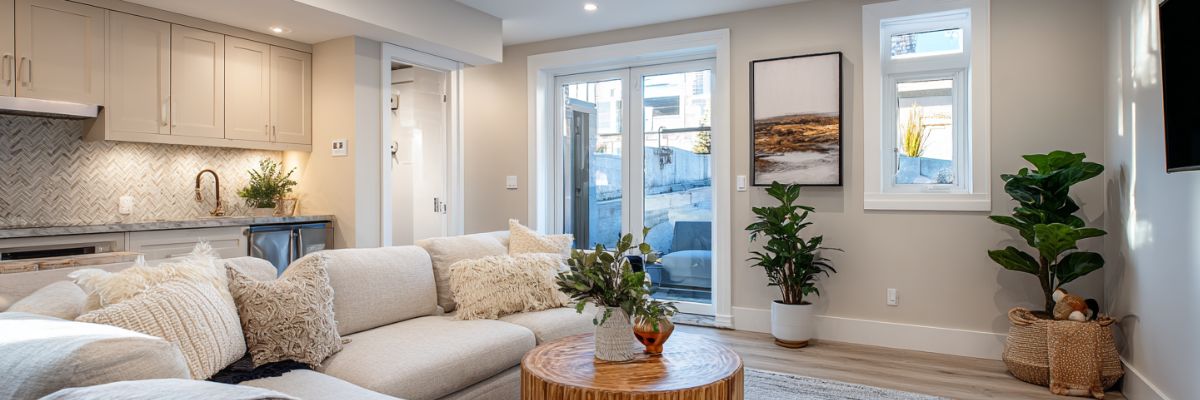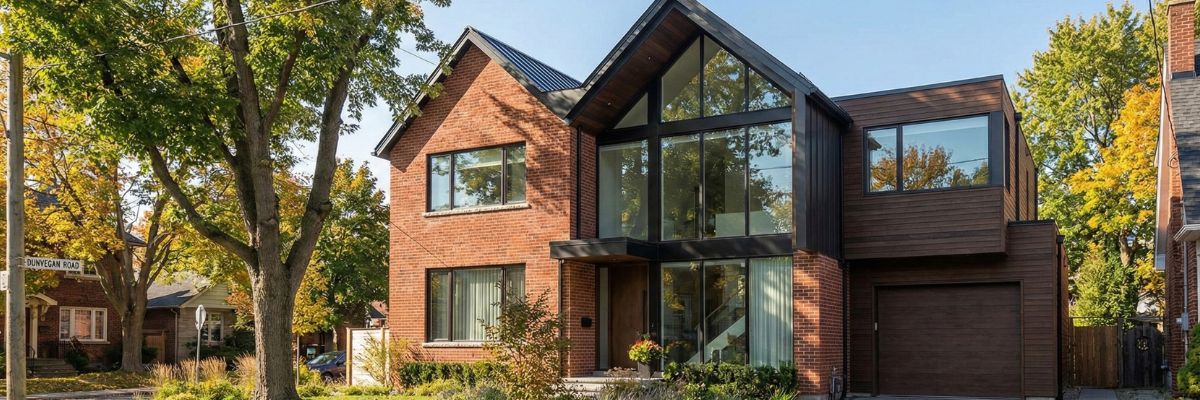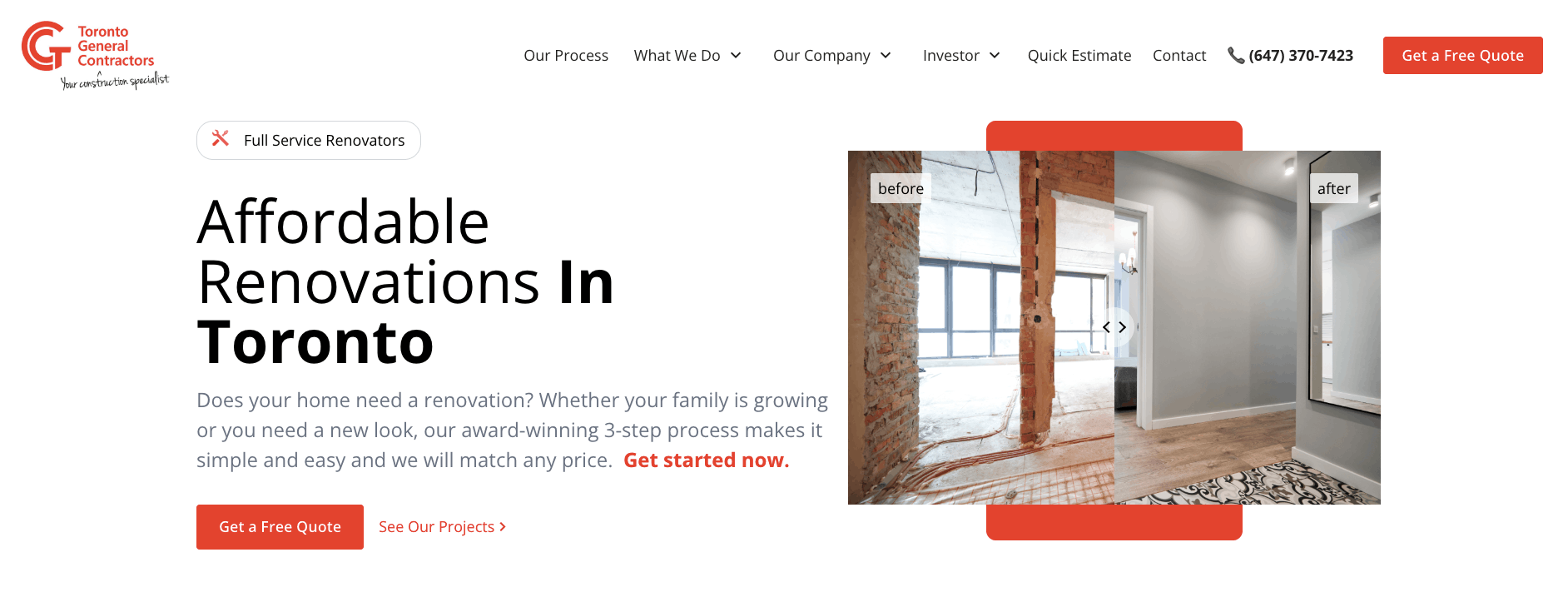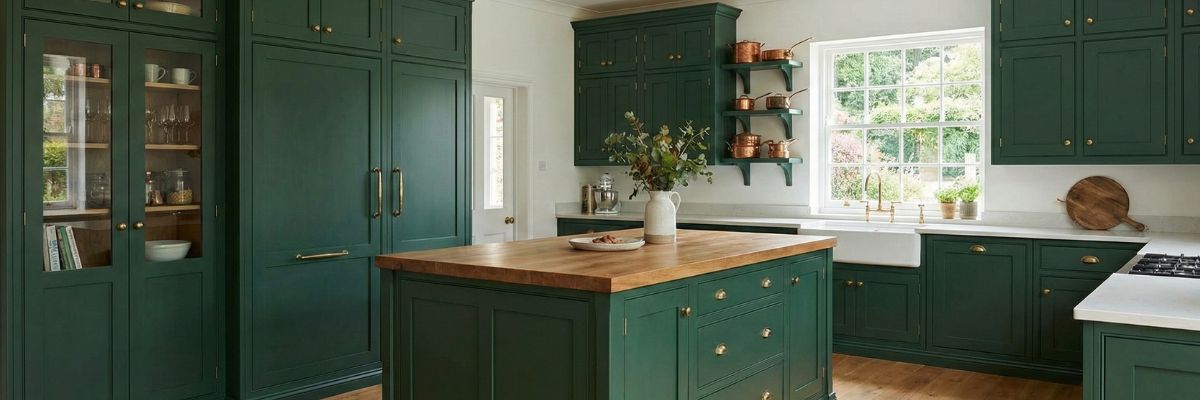How Much Does A Basement Renovation Cost In Toronto?
In Toronto, the cost of a basement renovation can range from $25 to $150 per square foot or $25,000 to $150,000, for a finished 1,000 square foot project. This cost range is dependent on the extent of the project, with basic renovations starting at $25,000, while luxury renovations with high-end finishes and extensive modifications, can go up to $150,000.
Keep reading to understand what factors affect the cost of a basement renovation in Toronto.
Additionally, use our basement renovation cost calculator for an instant and accurate quote on your next basement renovation!
Average Basement Renovation Costs By Tier
Basic Basement Renovation
A basic basement renovation in Toronto typically ranges from $25,000 to $40,000 and is ideal for homeowners who want to transform an unfinished basement into a clean, livable space without luxury upgrades. This tier generally includes insulation, drywall, basic flooring (such as carpet or vinyl planks), and standard baseboard trim.
Lighting is kept simple with flush-mount ceiling fixtures or basic pot lights, and electrical upgrades are minimal—typically limited to code compliance and a few outlets. Paint-grade doors, MDF baseboards, and laminate countertops may be used if a small wet bar or basic storage area is added.
The layout usually remains unchanged, and there are no structural modifications. While this tier doesn’t include custom design elements, it’s a practical and cost-effective solution for homeowners looking to gain functional square footage without overextending their budget.
Mid-Tier Basement Renovation
The mid-tier basement renovation, ranging from $40,000 to $70,000, introduces more design flexibility and higher-quality materials. In this tier, you’ll often find laminate or luxury vinyl plank flooring, upgraded lighting with dimmer controls, and additional rooms like a three-piece bathroom or compact kitchenette.
Homeowners may opt for semi-custom cabinetry, quartz or granite countertops, and improved plumbing and HVAC integration. The layout might be reconfigured to include a guest bedroom, home office, or entertainment area. Enhanced soundproofing between floors, moisture-resistant drywall, and built-in shelving or storage nooks are also common at this level.
Finishing touches like upgraded hardware, modern fixtures, and accent lighting begin to elevate the overall look and feel of the space, making it suitable for everyday family use and hosting guests.
Luxury Basement Renovation
Luxury basement renovations in Toronto start at $70,000 and can exceed $150,000, depending on the level of customization and features included. These projects often reimagine the basement entirely, with the addition of custom rooms such as a home theater, wine cellar, gym, spa-style bathroom, or full guest suite.
Materials used at this level are premium: engineered hardwood or heated tile floors, custom millwork, designer lighting systems, and bespoke cabinetry crafted from hardwoods like walnut or white oak. Adding kitchens or wet bars are built with stone countertops, tile backsplashes, and high-end appliances.
Home automation, integrated sound systems, advanced HVAC zoning, and LED lighting scenes are often part of the electrical scope. This tier may involve structural work such as underpinning to increase ceiling height or walk-out access for natural light. Every detail is tailored, delivering a luxurious extension of the home’s upper floors.

The Main Factors Affecting The Cost Of A Basement Renovation
1. Basement Size and Layout
The overall square footage is one of the biggest cost drivers. A larger basement requires more materials, labor, and time to complete. Open layouts are typically cheaper to finish than basements with multiple rooms, partitions, or custom features like bathrooms or kitchens.
2. Existing Conditions
Older basements or those with water issues, low ceilings, or inadequate insulation will need extra work before finishing. Addressing moisture, cracks, or uneven flooring can add thousands to the budget but is essential for long-term durability.
3. Scope of Renovation
The more features you add, the higher the cost. Simple updates such as new drywall, flooring, and lighting are relatively affordable. Adding a bathroom, kitchenette, or rental suite can double or triple the price because of the added plumbing, electrical, and ventilation work.
4. Materials and Finishes
The choice of flooring, cabinetry, lighting, and wall finishes plays a major role. Luxury vinyl flooring, quartz countertops, and recessed lighting are more expensive than basic carpet, laminate, and standard fixtures. Your design preferences can shift the total budget significantly.
5. Labor and Permits
Labor rates vary by region and contractor experience. In urban areas, skilled trades tend to cost more. If your renovation includes structural changes, plumbing, or electrical work, building permits will also add to the overall expense.
6. Intended Use
Whether you’re finishing your basement for extra living space, entertainment, or as a legal rental suite affects the complexity and cost. Rental units must meet additional code requirements for egress, fire separation, and soundproofing, which raise costs.
7. Accessibility and Utilities
If the basement is difficult to access or requires upgrades to existing utilities—such as a sump pump, electrical panel, or HVAC system—these modifications can add to the project total.
8. Design and Customization
Custom built-ins, feature walls, or specialty rooms like gyms or home theaters increase both labor and materials costs. Hiring a designer or architect to plan the space also adds professional fees but can improve long-term functionality and resale value.
In-Depth Cost Breakdown
What Is The Most Expensive Part Of A Basement Renovation?
The most expensive aspect of a basement renovation can vary based on the specific requirements of the project. Structural changes, such as reinforcing walls or altering load-bearing elements, typically drive up costs significantly.
Additionally, adding plumbing for a bathroom or kitchenette can be one of the priciest components, ranging from $3,000 to $20,000 for plumbing rough ins alone.
Electrical upgrades and installations also add to the expense, with costs between $800 to $1500.
Upgrading or installing heating, ventilation, and air conditioning (HVAC) systems can range from $5,000 to $11,000.
Floooring choices can vary widely, costing between $10,000 and $36,000 depending on the materials selected. If you're considering adding a full bathroom, expect additional costs of $20,000 to $35,000.
Lastly, ensuring proper waterproofing is essential and can cost between $1,900 and $6,300. Thus, understanding these potential expenses is crucial for accurately budgeting your basement renovation.
What is The ROI For A Basement Renovation in Toronto?
The average return on investment (ROI) for a basement renovation in Toronto is around 86%. This means that homeowners can expect to recoup about 86 cents for every dollar spent on the renovation when they sell their home.
Factors influencing this ROI include the quality of the finishes, the type of upgrades made (such as adding a bathroom or kitchenette), and the overall market conditions in your area.
It's essential to keep in mind that while basement renovations can significantly enhance livability and comfort, the exact ROI can vary based on individual circumstances and choices.
What Permits Do You Need For A Basement Renovation In Toronto?
For a basement renovation in Toronto the most common permit you’ll need is a building permit, which is required for any structural changes, adding or removing walls, enlarging windows, underpinning for extra ceiling height, or converting the space into a secondary dwelling unit. The cost for this typically starts around $206.53 plus $17.16 per square meter of renovated area, which can range from $400 to $1,000 or more depending on the size of your basement.
In addition to the building permit, your project may also require other specialized permits:
- Plumbing Permit: Required if adding or relocating bathrooms, kitchens, or laundry; typically costs $200–$300.
- Electrical Permit: Issued by the Electrical Safety Authority (ESA) for any new wiring, outlets, or panel upgrades; ranges from $79 to $400+.
- HVAC/Mechanical Permit: Needed if modifying or adding ductwork or ventilation systems; costs usually start at $250+.
- Zoning Review or Committee of Adjustment: Necessary if your renovation involves a second suite, separate entrance, or layout changes that don’t meet current zoning bylaws. Applying for a variance may cost over $1,000 and add several weeks to your timeline.
While minor cosmetic updates like painting, flooring, or changing cabinetry may not require permits, anything involving structural, electrical, or plumbing systems will. Starting without permits can lead to legal complications, insurance issues, or costly corrections later.
At Toronto General Contractors, we manage the entire permitting process for you—from initial drawings to final city inspections. Our team ensures everything is submitted accurately and approved quickly, so your project stays on time, on budget, and up to code.
The Cost of Basement Finishing Vs Renovation
Basement finishing and basement renovation are often used interchangeably, but they refer to two very different levels of work and investment.
A basement finishing project involves turning an unfinished space - usually bare concrete walls and floors - into a livable, comfortable area. The goal is to add usable square footage to the home without altering the structure or layout. Typical work includes framing, insulation, drywall, flooring, ceiling installation, lighting, and basic paint and trim. A finished basement might serve as a family room, playroom, home gym, or simple office. Because the work is largely cosmetic and involves standard systems, the average cost ranges from $25,000 to $50,000 CAD, or roughly $30 to $70 per square foot depending on material quality and regional labor costs.
A basement renovation, on the other hand, involves reconfiguring or upgrading an already finished or partially finished basement. This can include major layout changes, new plumbing for a bathroom or kitchenette, structural modifications, or converting the space into a legal secondary suite. Renovations may also include waterproofing, improved insulation, HVAC upgrades, egress windows, or soundproofing for rental compliance. Because of the higher level of complexity, plumbing, and code compliance involved, a basement renovation usually costs $50,000 to $120,000 CAD, or around $70 to $150 per square foot.
How to Save On Your Basement Renovation
Saving on a basement renovation in Canada is possible with careful planning, smart material choices, and realistic budgeting. Here are the most effective ways to reduce costs without sacrificing quality or long-term value:
1. Plan and Design Before You Build
The biggest cost overruns happen when homeowners start construction without a clear plan. Spend time upfront finalizing your layout, finishes, and purpose for the space. Decide early whether you’ll include a bathroom, kitchenette, or bedroom. Working with a designer or contractor for a simple floor plan can prevent costly mid-project changes and help you get accurate quotes.
2. Keep the Existing Layout
Avoid moving plumbing, electrical, or structural walls unless absolutely necessary. Keeping your bathroom, laundry, and mechanical areas in the same location saves thousands on labor and materials. Reusing existing walls or bulkheads can also cut framing and drywall costs.
3. Choose Cost-Effective Finishes
You can achieve a modern, polished basement without premium materials. Vinyl plank flooring offers a stylish, durable, and water-resistant option at a fraction of the cost of hardwood or tile. Prefabricated cabinets, painted drywall ceilings, and standard trim can all look great when installed cleanly. Spend strategically on focal points like lighting or a feature wall instead of upgrading every finish.
4. Do Some Work Yourself (If Skilled)
DIY work can lower costs, but only if you know your limits. Painting, installing baseboards, or handling basic demolition are safe DIY tasks that can save hundreds or even thousands. However, electrical, plumbing, and structural work should always be done by licensed professionals to ensure safety and compliance with code.
5. Get Multiple Quotes and Compare Scopes
Always get at least three detailed quotes from reputable contractors. Compare not just price but also what’s included: materials, permits, cleanup, and warranties. The lowest bid isn’t always the best deal if it cuts corners on insulation, moisture protection, or code compliance.
6. Renovate During the Off-Season
Winter and late fall are slower periods for many renovation companies. Scheduling your project then can sometimes lead to better pricing or faster completion times.
7. Focus on Energy Efficiency
Upgrading insulation, sealing gaps, and installing LED lighting may cost more initially but reduce utility bills long-term. You may also qualify for Canadian home energy rebates, such as those offered through the Canada Greener Homes Grant or Toronto based programs.
8. Reuse and Repurpose Materials
If you’re renovating an older basement, consider reusing existing doors, light fixtures, or shelving. Buying gently used materials from Habitat for Humanity ReStores or surplus outlets can also reduce expenses significantly.
9. Leave Space for Future Additions
If your budget is tight, focus on essential upgrades first - waterproofing, insulation, and flooring - and leave plumbing rough-ins for future bathrooms or kitchenettes so that you can convert your basement to an apartment. This phased approach allows you to expand later without redoing previous work.
10. Set Aside a Contingency Fund
Even with good planning, surprises happen in basements - hidden leaks, electrical issues, or subfloor problems. Budget an extra 10–15% to handle these issues calmly without disrupting your project or financing.
Conclusion
A basement renovation in Toronto costs between $25 to $150 per square foot or $25,000 to $150,000 for a finished 1,000 square foot project. The cost of your basement remodel will be heavily influinced by the scope of your project and the materials used. The more complicated and fancy your project is, the more it will cost overall.
If you are interested in learning exactly how much a basement remodel in Toronto would cost, use our Basement Cost Calculator for an instant estimate or talk to us today!



.jpg)



.jpg)

.jpg)
